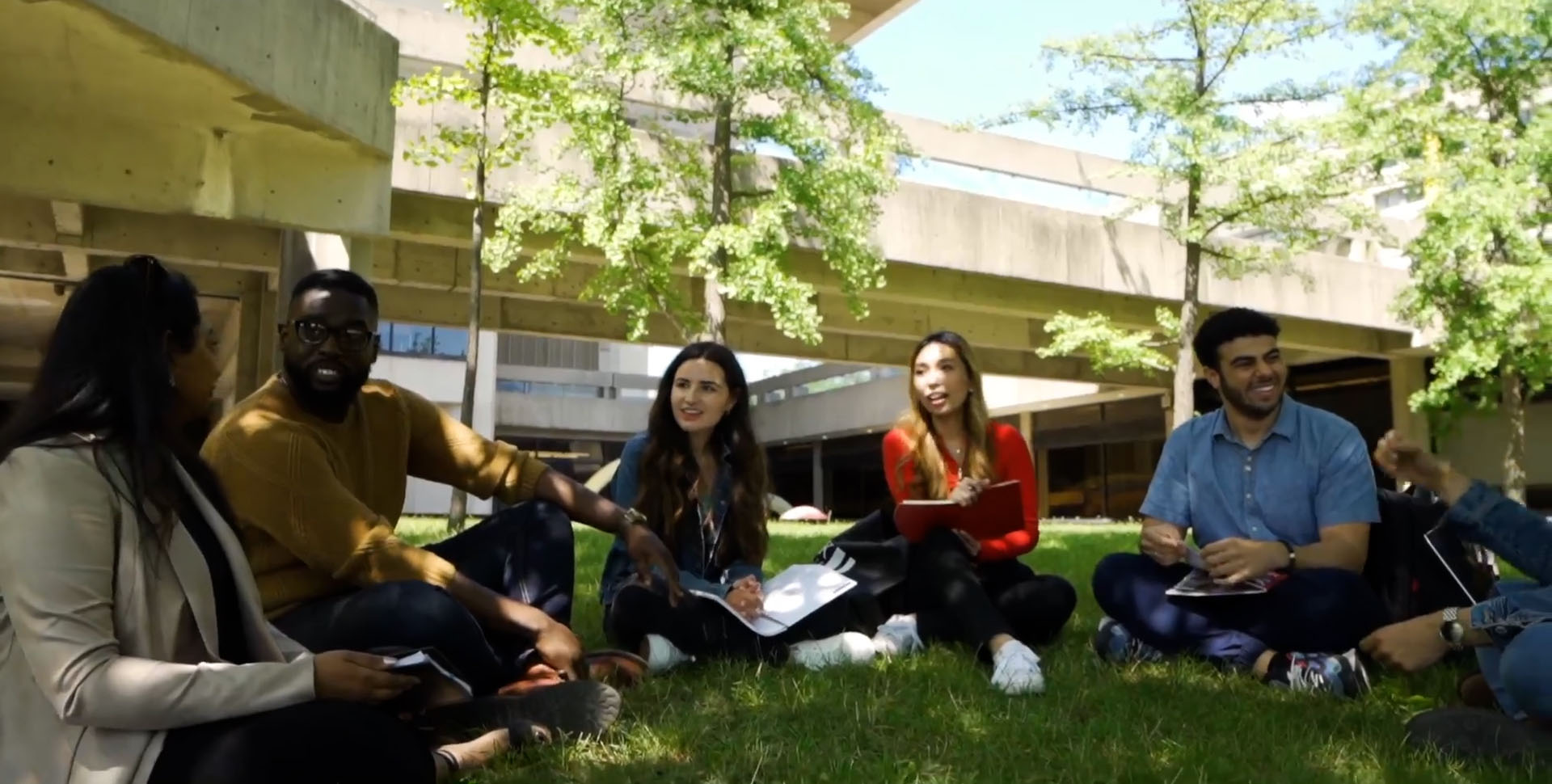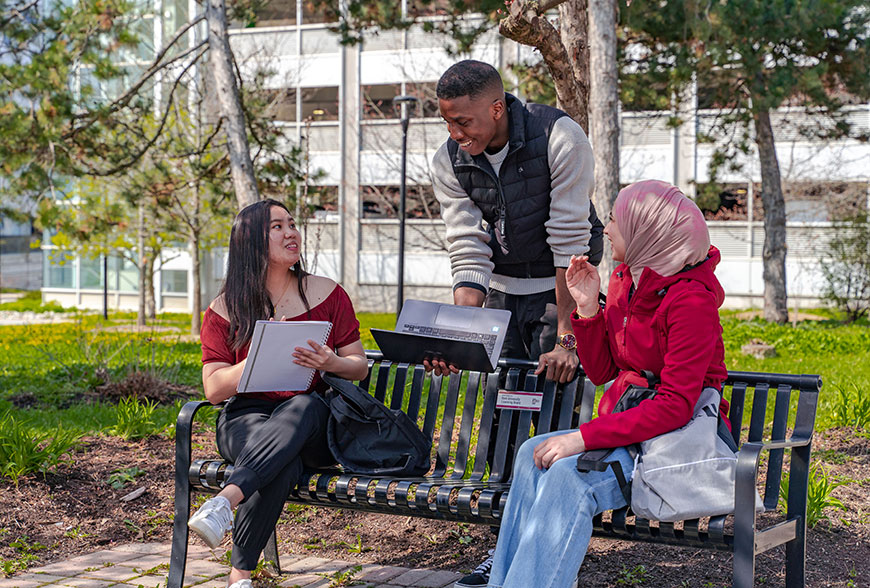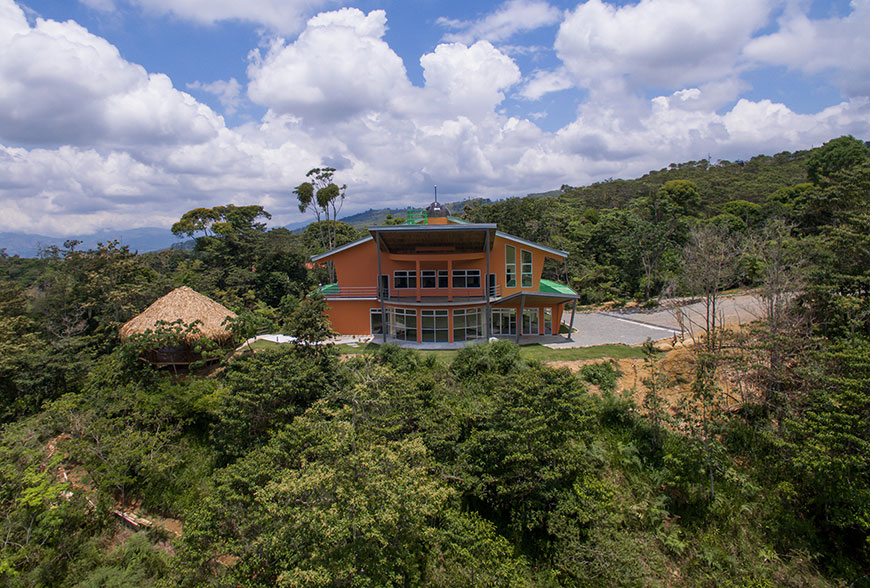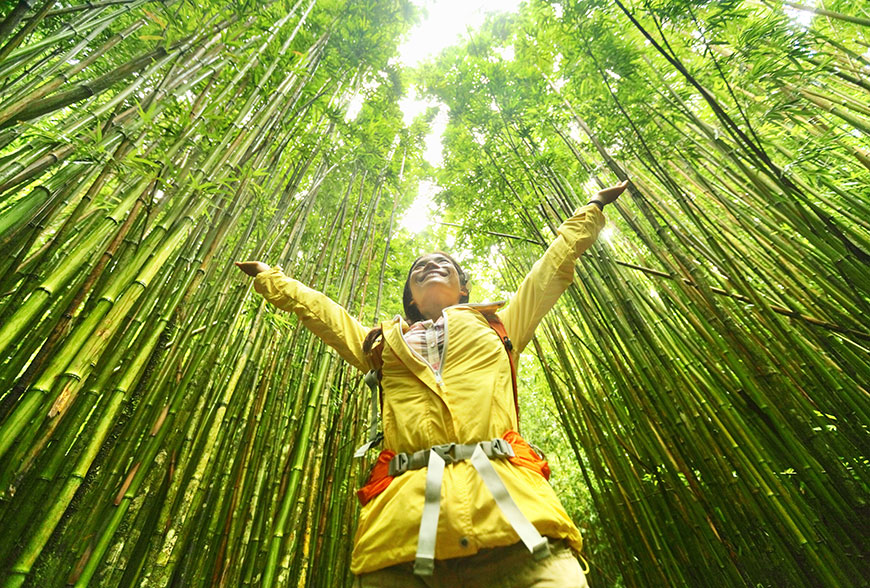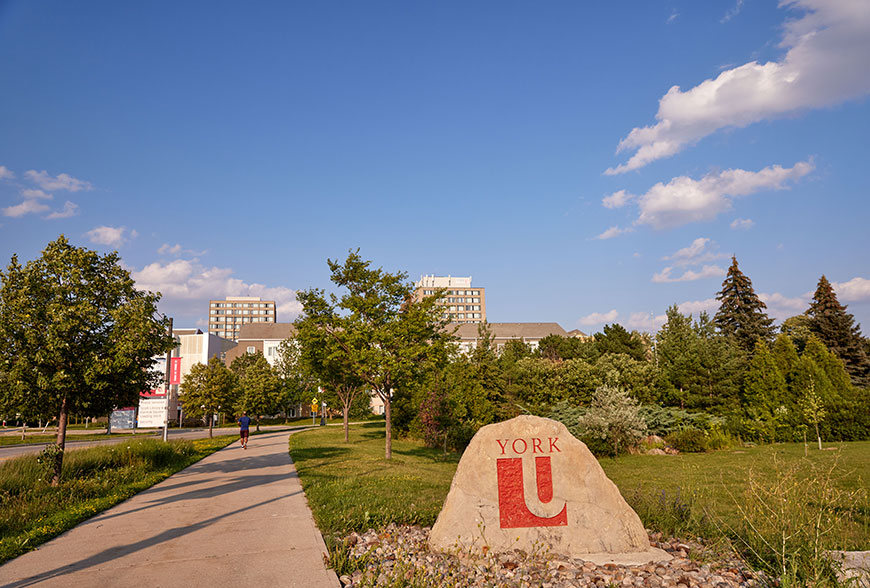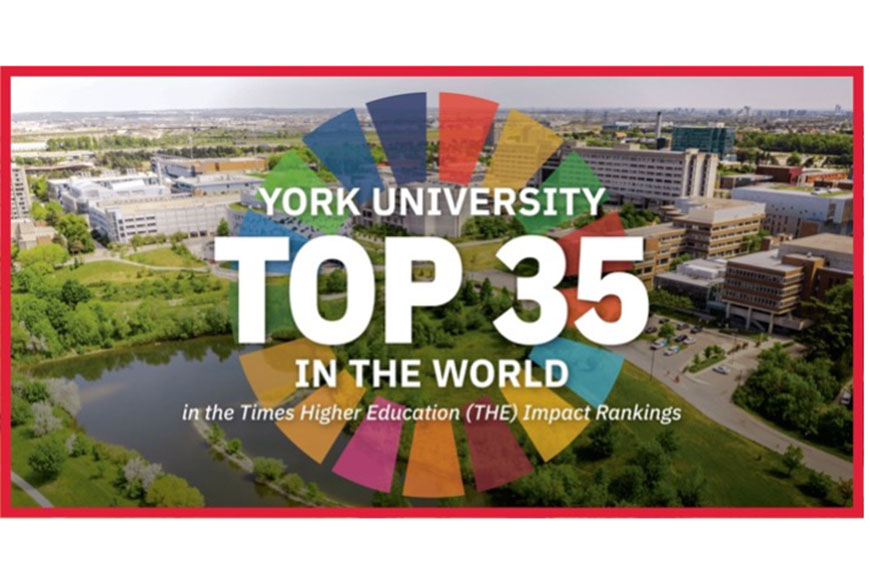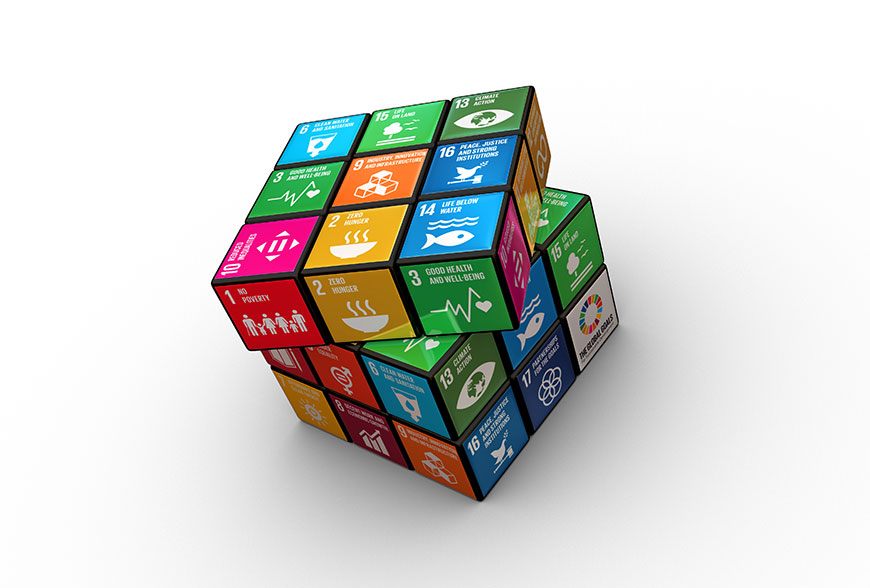As a leading international teaching and research university, York prides itself on its diverse community, which includes students, scholars and partners from across the world. From promoting global citizenship among our student population to advancing conservation efforts for the Las Nubes Rainforest at our Eco-Campus in Costa Rica, we are leveraging the intersectionality of people, place and knowledge to drive our impact and address global issues ranging from climate change to political polarization.
Over the past year, York has amplified its global engagement by collaborating on innovative research projects, securing funding for student mobility programs, creating new tools to integrate the United Nations Sustainable Development Goals into our courses, raising awareness of social justice issues through a global lens, and undertaking extensive community consultations to develop a new Global Engagement & Internationalization Strategy.
$3.9M
bursaries reserved to support international students through pandemic and global crisis responses.
15,926
international students from across 171 countries, representing 29% of our student population.*
*students who are citizens of other countries and/or non-Canadians. Includes domestic and visa students.
36
Globally Networked Learning workshops held, engaging 900+ students and partners across 8 countries.
1,693
full-time faculty with doctoral or equivalent degrees. 35.7% have completed their degrees from abroad.
The pandemic deeply impacted York’s entire student body and international students were faced with unique challenges. Many were isolated from their academic pursuits as well as their social support networks in Canada and in their home countries.
In recognition of these challenging circumstances, York provided a range of supports for international students, from providing University-paid quarantine accommodations for more than 3,000 students and conducting 875 wellness checks for students in self-arranged quarantine to disbursing $8.73 million in International Student bursaries that supported 2,754 students.
Following the lifting of most public health requirements and the transition to a community of care approach to health and safety, the University has focused on building back its international community. After conducting consultations with all key stakeholders, York International is due to unveil a new Global Engagement & Internationalization Strategy in Fall 2022. The Strategy will guide efforts in attracting international talent to further enrich and diversify our community and welcome the introduction of new perspectives that expand the frontiers of knowledge and advance sustainable development.
SDG4: Quality Education, SDG10: Reduced Inequalities
A new Las Nubes Strategic Plan aims to grow capacity at York’s Eco-Campus and advocate for positive change for local and global communities.
Established in 2020, the Las Nubes Project fosters collaboration with local communities and organizations in Costa Rica on research and conservation programs with a focus on biodiversity protection, rural sustainability, environmental education in local schools and the use of Geographic Information Systems (GIS) and remote-sensing as a decision-support tool for environmental management.
The new strategy, to launch in Fall 2022, proposes developing the campus through a series of programs and offerings — including virtual placements for students —and new opportunities to enhance community engagement through environmental education initiatives.
One of the most notable initiatives outlined in the strategy is the development of the Brunca Living Museum in partnership with the Faculty of Arts, Media, Performance & Design and York U Libraries to recognize and celebrate the Indigenous Peoples living in Costa Rica.
SDG 11: Sustainable Cities and Communities
Through the Go Global Challenge, students and their peers around the world were invited to take action towards achieving the United Nations 17 SDGs. Go Global was supported with $500,000 in funding from the Government of Canada’s Outbound Student Mobility Pilot Program Global Skills Opportunity.
The program offered facilitated discussions, workshops and immersive abroad study opportunities. Students developed critical and adaptable skills, including intercultural communication, leadership, creativity, digital fluency and project management. Each skill is important to solving real-world challenges, especially those conveyed through the SDGs.
SDG 17: Partnership for the Goals
The Communications & Public Affairs teams were recognized with several international awards for enhancing York’s global reputation through campaigns including “Right the Future” Brand Campaign and the Building a Better Future: York University Academic Plan 2020-2025 website.
The Communications & Public Affairs Division was awarded two gold, two silver and two bronze awards by the Council for Advancement & Support of Education (CASE) in the 2022 Circle of Excellence Awards, the premier recognition program for education advancement.
The awards include:
- Gold: Building a Better Future: York University Academic Plan 2020-2025 Website;
- Gold: “Right the Future” Brand Campaign, series of 15-second ads in tv and video format;
- Silver: “The Drake Effect” (The York University Magazine article); and
- Silver: “Right The Future” Brand Campaign, Spotify 30-second spot.
York University’s global leadership in space technology research and experience in supporting ten international space missions have attracted international attention.
Professors at the Lassonde School of Engineering were approached by the Egyptian Cultural and Educational Bureau in Montreal to collaborate on a space training program for Egyptian students. When complications prevented Egyptian students from visiting the campus, the Faculty pivoted through the development of a virtual space engineering teaching mission attended by 45 Egyptian students from various universities. The mission design project was led by Professor Franz Newland and overseen by Professor Jinjun Shan in the summer of 2022.
The students gained first-hand experience in creating a successful space mission that embeds the SDGs into its design and promotes global cooperation and the sharing of resources, talent and knowledge.
SDG4: Quality Education, SDG9: Industry, Innovation, and Infrastructure
Two years after launching the University Academic Plan 2020-2025, which included a pan-university challenge to elevate York’s contributions to the United Nations 17 Sustainable Development Goals (SDGs), York University has ascended to the world’s top 35 in the Times Higher Education Impact Rankings for activating the SDGs through world-class research, stewardship, outreach and teaching.
In 2022, University ranked 33 out of 1,406 post-secondary institutions worldwide, moving up an impressive 34 spots from its position at 67 out of 1,117 post-secondary institutions in the 2021 rankings.
These achievements reflect York’s dedicated efforts to address complex global challenges identified in the SDGs — from climate change to inequality to world health issues such as the pandemic — through inclusive, interdisciplinary, and transformative action. York’s UN Sustainable Development Goals Report and accompanying website will serve as transparent records of the concrete actions the University is taking to advance the SDGs both locally and globally.
In June 2022, York created a new SDG-in-the-Classroom Toolkit to amplify engagement with the 17 SDGs across pedagogical frameworks and student learning experiences.
The virtual toolkit consists of interdisciplinary teaching and learning resources that encourage educators to infuse the SDGs into their courses and design innovative teaching materials. It will also serve as a dynamic platform for collaboration and formalize the Community of Practice developed by York University Professor Cheryl van Daalen-Smith.
In line with York’s commitment to driving positive change locally and globally, the comprehensive suite of supports offered by the toolkit is available to all educators within York University, Canada and around the world.
SDG 17: Partnership for the Goals
Created by Syed Imran Ali, a research fellow at York’s Dahdaleh Institute for Global Health Research, the Safe Water Optimization Tool (SWOT) is a prime example of how York researchers are translating theory into action.
SWOT analyzes site-specific water samples to help determine case-by-case necessity and levels of chlorine needed to provide clean drinking water and lower levels of waterborne disease. This important tool has already been deployed in refugee camps in Nigeria, Bangladesh and Tanzania.
SWOT was developed in cooperation with Médecins sans Frontières and has since been heralded by Canadian and international groups as a triumph in translating research into real-life impact.
In May 2022, the tool was recognized for innovation at the Emergency Environmental Health Forum with a presentation by York MASc candidate Michael DeSanti.
SDG6: Clean Water and Sanitation
The Klabona Keepers, a film co-directed by Tamo Campos, a Master of Environmental Studies (MES) student at York, was one of five films selected for presentation at the 2022 Human Rights Watch Film Festival in Toronto.
The film documents the work of a dynamic Indigenous community over 15 years as they effectively protect the Sacred Headwaters, known as the Klabona, in northwest British Columbia, from industrial activities.
SDG 15: Life on Land
In March 2022, York hosted “Solidarity with Ukraine: Music, Poetry, and Film Screening” to support the filmmaking community documenting the war in Ukraine.
The event, which drew an international audience of virtual attendees that included Ukrainian political activist Denis Pilash, was organized by graduate students from the Faculty of Arts, Media, Performance & Design (AMPD) in partnership with the Ontario Public Interest Research Group (OPIRG) at York University, York Graduate Film Student Association (GFSA), York University’s Graduate Student Association (YUGSA) and the Goethe Institute.
SDG16: Peace, Justice, and Strong Institutions
Learn more about our priorities:
